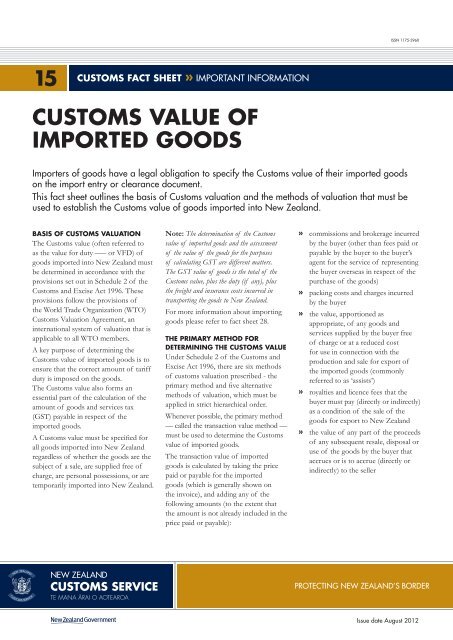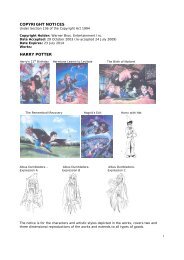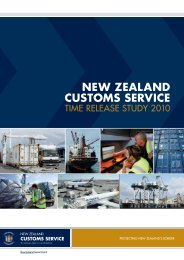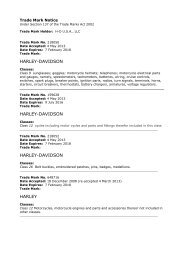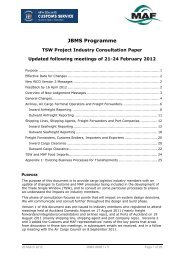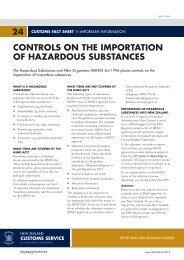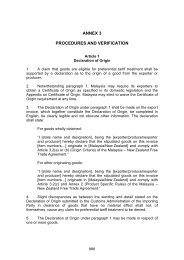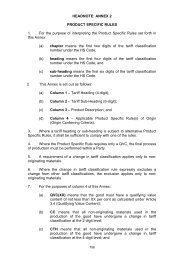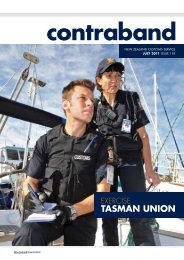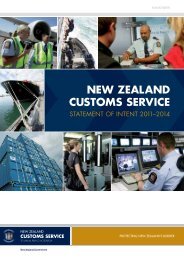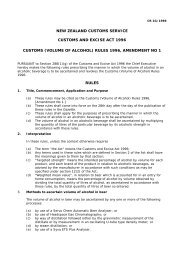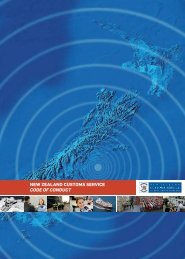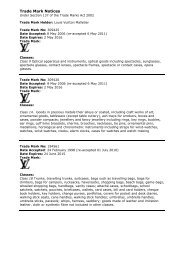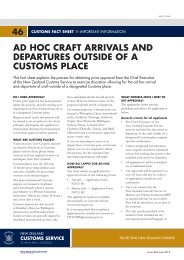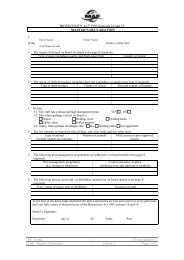Fact Sheet 15 - Customs value of imported goods - New Zealand ...
Fact Sheet 15 - Customs value of imported goods - New Zealand ...
Fact Sheet 15 - Customs value of imported goods - New Zealand ...
You also want an ePaper? Increase the reach of your titles
YUMPU automatically turns print PDFs into web optimized ePapers that Google loves.
ISSN 1175-396X<br />
<strong>15</strong><br />
CUSTOMS FACT SHEET » IMPORTANT INFORMATION<br />
CUSTOMS VALUE OF<br />
IMPORTED GOODS<br />
Importers <strong>of</strong> <strong>goods</strong> have a legal obligation to specify the <strong>Customs</strong> <strong>value</strong> <strong>of</strong> their <strong>imported</strong> <strong>goods</strong><br />
on the import entry or clearance document.<br />
This fact sheet outlines the basis <strong>of</strong> <strong>Customs</strong> valuation and the methods <strong>of</strong> valuation that must be<br />
used to establish the <strong>Customs</strong> <strong>value</strong> <strong>of</strong> <strong>goods</strong> <strong>imported</strong> into <strong>New</strong> <strong>Zealand</strong>.<br />
BASIS OF CUSTOMS VALUATION<br />
The <strong>Customs</strong> <strong>value</strong> (<strong>of</strong>ten referred to<br />
as the <strong>value</strong> for duty –— or VFD) <strong>of</strong><br />
<strong>goods</strong> <strong>imported</strong> into <strong>New</strong> <strong>Zealand</strong> must<br />
be determined in accordance with the<br />
provisions set out in Schedule 2 <strong>of</strong> the<br />
<strong>Customs</strong> and Excise Act 1996. These<br />
provisions follow the provisions <strong>of</strong><br />
the World Trade Organization (WTO)<br />
<strong>Customs</strong> Valuation Agreement, an<br />
international system <strong>of</strong> valuation that is<br />
applicable to all WTO members.<br />
A key purpose <strong>of</strong> determining the<br />
<strong>Customs</strong> <strong>value</strong> <strong>of</strong> <strong>imported</strong> <strong>goods</strong> is to<br />
ensure that the correct amount <strong>of</strong> tariff<br />
duty is imposed on the <strong>goods</strong>.<br />
The <strong>Customs</strong> <strong>value</strong> also forms an<br />
essential part <strong>of</strong> the calculation <strong>of</strong> the<br />
amount <strong>of</strong> <strong>goods</strong> and services tax<br />
(GST) payable in respect <strong>of</strong> the<br />
<strong>imported</strong> <strong>goods</strong>.<br />
A <strong>Customs</strong> <strong>value</strong> must be specified for<br />
all <strong>goods</strong> <strong>imported</strong> into <strong>New</strong> <strong>Zealand</strong><br />
regardless <strong>of</strong> whether the <strong>goods</strong> are the<br />
subject <strong>of</strong> a sale, are supplied free <strong>of</strong><br />
charge, are personal possessions, or are<br />
temporarily <strong>imported</strong> into <strong>New</strong> <strong>Zealand</strong>.<br />
Note: The determination <strong>of</strong> the <strong>Customs</strong><br />
<strong>value</strong> <strong>of</strong> <strong>imported</strong> <strong>goods</strong> and the assessment<br />
<strong>of</strong> the <strong>value</strong> <strong>of</strong> the <strong>goods</strong> for the purposes<br />
<strong>of</strong> calculating GST are different matters.<br />
The GST <strong>value</strong> <strong>of</strong> <strong>goods</strong> is the total <strong>of</strong> the<br />
<strong>Customs</strong> <strong>value</strong>, plus the duty (if any), plus<br />
the freight and insurance costs incurred in<br />
transporting the <strong>goods</strong> to <strong>New</strong> <strong>Zealand</strong>.<br />
For more information about importing<br />
<strong>goods</strong> please refer to fact sheet 28.<br />
THE PRIMARY METHOD FOR<br />
DETERMINING THE CUSTOMS VALUE<br />
Under Schedule 2 <strong>of</strong> the <strong>Customs</strong> and<br />
Excise Act 1996, there are six methods<br />
<strong>of</strong> customs valuation prescribed - the<br />
primary method and five alternative<br />
methods <strong>of</strong> valuation, which must be<br />
applied in strict hierarchical order.<br />
Whenever possible, the primary method<br />
— called the transaction <strong>value</strong> method —<br />
must be used to determine the <strong>Customs</strong><br />
<strong>value</strong> <strong>of</strong> <strong>imported</strong> <strong>goods</strong>.<br />
The transaction <strong>value</strong> <strong>of</strong> <strong>imported</strong><br />
<strong>goods</strong> is calculated by taking the price<br />
paid or payable for the <strong>imported</strong><br />
<strong>goods</strong> (which is generally shown on<br />
the invoice), and adding any <strong>of</strong> the<br />
following amounts (to the extent that<br />
the amount is not already included in the<br />
price paid or payable):<br />
» commissions and brokerage incurred<br />
by the buyer (other than fees paid or<br />
payable by the buyer to the buyer’s<br />
agent for the service <strong>of</strong> representing<br />
the buyer overseas in respect <strong>of</strong> the<br />
purchase <strong>of</strong> the <strong>goods</strong>)<br />
» packing costs and charges incurred<br />
by the buyer<br />
» the <strong>value</strong>, apportioned as<br />
appropriate, <strong>of</strong> any <strong>goods</strong> and<br />
services supplied by the buyer free<br />
<strong>of</strong> charge or at a reduced cost<br />
for use in connection with the<br />
production and sale for export <strong>of</strong><br />
the <strong>imported</strong> <strong>goods</strong> (commonly<br />
referred to as ‘assists’)<br />
» royalties and licence fees that the<br />
buyer must pay (directly or indirectly)<br />
as a condition <strong>of</strong> the sale <strong>of</strong> the<br />
<strong>goods</strong> for export to <strong>New</strong> <strong>Zealand</strong><br />
» the <strong>value</strong> <strong>of</strong> any part <strong>of</strong> the proceeds<br />
<strong>of</strong> any subsequent resale, disposal or<br />
use <strong>of</strong> the <strong>goods</strong> by the buyer that<br />
accrues or is to accrue (directly or<br />
indirectly) to the seller<br />
Issue date August 2012
CUSTOMS FACT SHEET <strong>15</strong><br />
» the <strong>value</strong> <strong>of</strong> any materials,<br />
components parts, and other<br />
<strong>goods</strong> incorporated in the <strong>imported</strong><br />
<strong>goods</strong> for the purpose <strong>of</strong> repair<br />
to, or refurbishment <strong>of</strong>, those <strong>goods</strong><br />
prior to export <strong>of</strong> the <strong>goods</strong> to<br />
<strong>New</strong> <strong>Zealand</strong>, and the price paid<br />
for the service <strong>of</strong> repair<br />
or refurbishment<br />
» costs <strong>of</strong> transportation and<br />
insurance <strong>of</strong>, and the loading,<br />
unloading, and handling charges etc<br />
associated with the transportation <strong>of</strong>,<br />
the <strong>imported</strong> <strong>goods</strong> until the <strong>goods</strong><br />
have left the country <strong>of</strong> export that<br />
are paid or payable by the buyer to<br />
the seller or for the seller’s benefit, as<br />
a condition <strong>of</strong> the transaction.<br />
However, if the following charges are<br />
included in the price paid or payable<br />
for the <strong>imported</strong> <strong>goods</strong> and the amount<br />
is identified separately, the charges<br />
can be deducted when establishing the<br />
transaction <strong>value</strong>:<br />
» the costs <strong>of</strong> transportation and<br />
insurance <strong>of</strong>, and the loading,<br />
unloading, and handling charges etc<br />
associated with the transportation <strong>of</strong>,<br />
the <strong>imported</strong> <strong>goods</strong> from the time<br />
the <strong>goods</strong> have left the country <strong>of</strong><br />
export<br />
» any reasonable cost, charge, or<br />
expense that is incurred for the<br />
construction, erection, assembly,<br />
or maintenance <strong>of</strong>, or technical<br />
assistance provided in respect <strong>of</strong>, the<br />
<strong>goods</strong> after the <strong>goods</strong> are <strong>imported</strong><br />
into <strong>New</strong> <strong>Zealand</strong><br />
» any reasonable cost, charge, or<br />
expense that is incurred in respect <strong>of</strong><br />
the transportation or insurance <strong>of</strong><br />
the <strong>goods</strong> within <strong>New</strong> <strong>Zealand</strong><br />
» any <strong>Customs</strong> duties or other taxes<br />
payable in <strong>New</strong> <strong>Zealand</strong> by reason <strong>of</strong><br />
the importation or sale <strong>of</strong> the <strong>goods</strong>.<br />
WHEN THE TRANSACTION VALUE<br />
METHOD CANNOT BE USED<br />
The acceptance <strong>of</strong> the transaction<br />
<strong>value</strong> method as the applicable method<br />
<strong>of</strong> valuation is subject to a number <strong>of</strong><br />
requirements. The main requirements<br />
include:<br />
» the <strong>imported</strong> <strong>goods</strong> must be subject<br />
to a sale between a buyer and a seller<br />
» the particular sale must be made<br />
with a view to export the <strong>goods</strong><br />
to <strong>New</strong> <strong>Zealand</strong><br />
» there are no restrictions respecting<br />
the disposition or use <strong>of</strong> the <strong>goods</strong><br />
by the buyer, other than restrictions<br />
that:<br />
› are imposed by law; or<br />
› limit the geographic area in<br />
which the <strong>goods</strong> may be resold;<br />
or<br />
› do not substantially affect the<br />
<strong>value</strong> <strong>of</strong> the <strong>goods</strong>.<br />
» the price paid or payable for the<br />
<strong>goods</strong> has not been influenced by<br />
any relationship between the buyer<br />
and seller <strong>of</strong> the <strong>goods</strong>.<br />
Where the <strong>imported</strong> <strong>goods</strong> have not<br />
been sold for export to <strong>New</strong> <strong>Zealand</strong>,<br />
or where the transaction <strong>value</strong> is not<br />
acceptable as the <strong>Customs</strong> <strong>value</strong> because<br />
the price paid or payable for the <strong>goods</strong><br />
is affected by certain conditions, the<br />
<strong>Customs</strong> <strong>value</strong> <strong>of</strong> the <strong>goods</strong> cannot be<br />
<strong>value</strong>d for <strong>Customs</strong> purposes using the<br />
transaction <strong>value</strong> method. Examples<br />
<strong>of</strong> such <strong>goods</strong> are - gifts, free samples,<br />
<strong>goods</strong> <strong>imported</strong> on consignment, <strong>goods</strong><br />
<strong>imported</strong> by branches which are not<br />
separate legal entities, <strong>goods</strong> <strong>imported</strong><br />
under a hire or leasing contract.<br />
ALTERNATIVE METHODS OF<br />
DETERMINING THE CUSTOMS VALUE<br />
When <strong>imported</strong> <strong>goods</strong> cannot be <strong>value</strong>d<br />
under the transaction <strong>value</strong> method,<br />
the <strong>Customs</strong> <strong>value</strong> <strong>of</strong> the <strong>goods</strong> must<br />
be determined using the first possible<br />
method out <strong>of</strong> the five alternative<br />
methods <strong>of</strong> valuation set out in clauses<br />
4 to 8 <strong>of</strong> Schedule 2.<br />
The alternative methods <strong>of</strong> valuation, in<br />
sequential order <strong>of</strong> consideration, are:<br />
» Transaction <strong>value</strong> <strong>of</strong> identical <strong>goods</strong><br />
(‘identical <strong>goods</strong> method’) — the<br />
basis <strong>of</strong> the identical <strong>goods</strong> method<br />
is to use the transaction <strong>value</strong> <strong>of</strong><br />
identical <strong>goods</strong> that had previously<br />
been sold for export to <strong>New</strong> <strong>Zealand</strong><br />
as a benchmark to determine the<br />
<strong>Customs</strong> <strong>value</strong>. This method would<br />
generally be applicable if there<br />
was a recent importation into<br />
<strong>New</strong> <strong>Zealand</strong> <strong>of</strong> <strong>goods</strong> that are the<br />
same in all respects as the <strong>goods</strong><br />
being <strong>value</strong>d<br />
» Transaction <strong>value</strong> <strong>of</strong> similar <strong>goods</strong><br />
(‘similar <strong>goods</strong> method’) — the<br />
basis <strong>of</strong> the similar <strong>goods</strong> method<br />
is to use the transaction <strong>value</strong> <strong>of</strong><br />
similar <strong>goods</strong> that had previously<br />
been sold for export to <strong>New</strong> <strong>Zealand</strong><br />
as a benchmark to determine the<br />
<strong>Customs</strong> <strong>value</strong>. This method would<br />
generally be applicable if there<br />
was a recent importation into<br />
<strong>New</strong> <strong>Zealand</strong> <strong>of</strong> <strong>goods</strong> that closely<br />
resemble the <strong>goods</strong> being <strong>value</strong>d<br />
» Deductive <strong>value</strong> — the basis <strong>of</strong> the<br />
deductive <strong>value</strong> method is to take<br />
the resale price <strong>of</strong> the <strong>goods</strong> in<br />
<strong>New</strong> <strong>Zealand</strong> and reduce it to what<br />
is effectively the <strong>Customs</strong> <strong>value</strong> that<br />
would likely have existed between<br />
a buyer and seller had there been a<br />
sale for export to <strong>New</strong> <strong>Zealand</strong> in<br />
the first place. This method would<br />
generally be applicable in situations<br />
where the <strong>imported</strong> <strong>goods</strong> are sold<br />
in <strong>New</strong> <strong>Zealand</strong> within 90 days <strong>of</strong><br />
their importation<br />
<strong>Customs</strong> Value <strong>of</strong> Imported Goods Issue date August 2012 2
CUSTOMS FACT SHEET <strong>15</strong><br />
» Computed <strong>value</strong> — the computed<br />
<strong>value</strong> method is based on the<br />
production cost <strong>of</strong> the <strong>imported</strong><br />
<strong>goods</strong>, plus an amount for pr<strong>of</strong>it and<br />
general expenses generally reflected<br />
in sales for export to <strong>New</strong> <strong>Zealand</strong><br />
by the producers <strong>of</strong> the <strong>goods</strong>. Use<br />
<strong>of</strong> this method is generally restricted<br />
to situations where the importer has<br />
access to the producer’s accounts in<br />
relation to the costs <strong>of</strong> production<br />
<strong>of</strong> the <strong>goods</strong><br />
» Residual basis <strong>of</strong> valuation —<br />
if none <strong>of</strong> the above methods<br />
<strong>of</strong> valuation are suitable, the<br />
<strong>Customs</strong> <strong>value</strong> <strong>of</strong> the <strong>imported</strong><br />
<strong>goods</strong> will need to be determined<br />
using information available in<br />
<strong>New</strong> <strong>Zealand</strong>, based on a flexible<br />
interpretation <strong>of</strong> one <strong>of</strong> the<br />
previous methods.<br />
Note:<br />
Where applicable, importers can request that<br />
the order <strong>of</strong> consideration <strong>of</strong> the deductive<br />
<strong>value</strong> method and the computed <strong>value</strong> method<br />
be reversed when determining the <strong>Customs</strong><br />
<strong>value</strong> <strong>of</strong> their <strong>goods</strong>.<br />
METHODS OF VALUATION THAT<br />
CANNOT BE USED<br />
A <strong>Customs</strong> <strong>value</strong> cannot be determined<br />
on the basis <strong>of</strong>:<br />
» the selling price in <strong>New</strong> <strong>Zealand</strong> <strong>of</strong><br />
<strong>goods</strong> produced in <strong>New</strong> <strong>Zealand</strong>; or<br />
» a basis which provides for the<br />
acceptance <strong>of</strong> the higher <strong>of</strong> two<br />
alternative <strong>value</strong>s; or<br />
» the price <strong>of</strong> <strong>goods</strong> on the domestic<br />
market <strong>of</strong> the country<br />
<strong>of</strong> exportation; or<br />
» the cost <strong>of</strong> production, other than<br />
computed <strong>value</strong>s that have been<br />
determined for identical or similar<br />
<strong>goods</strong> in accordance with the<br />
provisions <strong>of</strong> clause 7 <strong>of</strong> Schedule<br />
2; or<br />
» the price <strong>of</strong> <strong>goods</strong> for export to a<br />
country other than <strong>New</strong> <strong>Zealand</strong>,<br />
unless the <strong>goods</strong> were <strong>imported</strong> into<br />
<strong>New</strong> <strong>Zealand</strong>; or<br />
» minimum customs <strong>value</strong>s; or<br />
» arbitrary or fictitious <strong>value</strong>s.<br />
RATE OF EXCHANGE<br />
The <strong>Customs</strong> <strong>value</strong> is required to be<br />
specified in <strong>New</strong> <strong>Zealand</strong> dollars. If the<br />
invoiced amount (or some other amount<br />
needed to be taken into consideration<br />
to determine the <strong>Customs</strong> <strong>value</strong>) is not<br />
in <strong>New</strong> <strong>Zealand</strong> dollars, the amount<br />
must be converted to <strong>New</strong> <strong>Zealand</strong><br />
dollars at the <strong>Customs</strong> exchange rate<br />
in force on the day the import entry or<br />
clearance document is lodged with the<br />
<strong>New</strong> <strong>Zealand</strong> <strong>Customs</strong> Service. The<br />
exchange rates are set for two-week<br />
periods, and are published fortnightly<br />
in <strong>Customs</strong> Release as well as in the<br />
<strong>New</strong> <strong>Zealand</strong> <strong>Customs</strong> Service website<br />
www.customs.govt.nz<br />
EVIDENCE OF THE CUSTOMS VALUE<br />
To verify the correctness <strong>of</strong> the <strong>Customs</strong><br />
<strong>value</strong> declared by importers or their<br />
<strong>Customs</strong> agents, the <strong>New</strong> <strong>Zealand</strong><br />
<strong>Customs</strong> Service carries out a programme<br />
<strong>of</strong> post-entry audits.<br />
The <strong>New</strong> <strong>Zealand</strong> <strong>Customs</strong> Service<br />
does not require documents evidencing<br />
the <strong>Customs</strong> <strong>value</strong> to be presented at<br />
the time <strong>of</strong> clearance. Nevertheless,<br />
importers must keep records <strong>of</strong> all<br />
relevant information relating to the<br />
transaction for seven years after the<br />
<strong>goods</strong> have been entered, and to produce<br />
these documents to the <strong>New</strong> <strong>Zealand</strong><br />
<strong>Customs</strong> Service, as and when required.<br />
The records <strong>of</strong> information must be<br />
kept in <strong>New</strong> <strong>Zealand</strong>.<br />
It is an <strong>of</strong>fence to make an entry or<br />
declaration that is false or erroneous, or<br />
to fail to keep the relevant records for<br />
at least seven years, and administrative<br />
penalties and fines may apply.<br />
FOR FURTHER INFORMATION<br />
Contact your nearest <strong>of</strong>fice <strong>of</strong> the<br />
<strong>New</strong> <strong>Zealand</strong> <strong>Customs</strong> Service, visit the<br />
<strong>Customs</strong> website www.customs.govt.nz<br />
or call <strong>Customs</strong> on 0800 428 786<br />
(0800 4 CUSTOMS).<br />
Office <strong>of</strong> the Comptroller <strong>of</strong> <strong>Customs</strong>, PO Box 2218, Wellington<br />
Phone: +64 4 901 4500 » Fax: +64 4 901 4555 » www.customs.govt.nz<br />
ISSN 1175-396X<br />
<strong>Customs</strong> Value <strong>of</strong> Imported Goods<br />
Issue date August 2012 3


